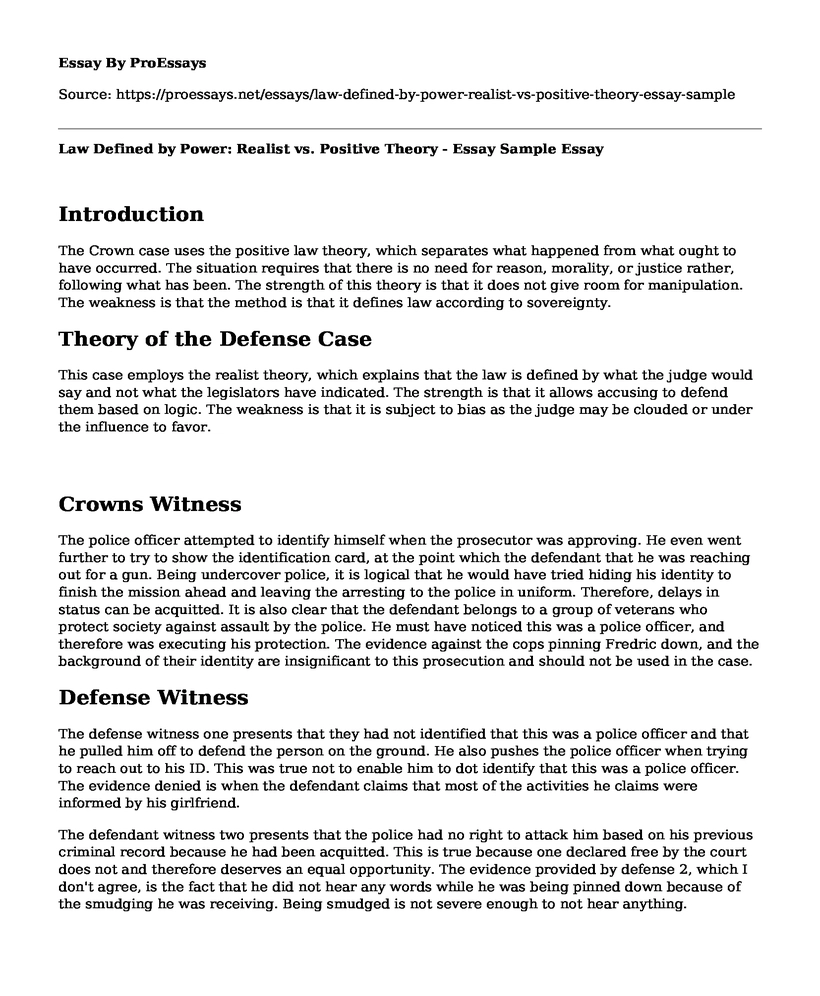Introduction
The Crown case uses the positive law theory, which separates what happened from what ought to have occurred. The situation requires that there is no need for reason, morality, or justice rather, following what has been. The strength of this theory is that it does not give room for manipulation. The weakness is that the method is that it defines law according to sovereignty.
Theory of the Defense Case
This case employs the realist theory, which explains that the law is defined by what the judge would say and not what the legislators have indicated. The strength is that it allows accusing to defend them based on logic. The weakness is that it is subject to bias as the judge may be clouded or under the influence to favor.
Crowns Witness
The police officer attempted to identify himself when the prosecutor was approving. He even went further to try to show the identification card, at the point which the defendant that he was reaching out for a gun. Being undercover police, it is logical that he would have tried hiding his identity to finish the mission ahead and leaving the arresting to the police in uniform. Therefore, delays in status can be acquitted. It is also clear that the defendant belongs to a group of veterans who protect society against assault by the police. He must have noticed this was a police officer, and therefore was executing his protection. The evidence against the cops pinning Fredric down, and the background of their identity are insignificant to this prosecution and should not be used in the case.
Defense Witness
The defense witness one presents that they had not identified that this was a police officer and that he pulled him off to defend the person on the ground. He also pushes the police officer when trying to reach out to his ID. This was true not to enable him to dot identify that this was a police officer. The evidence denied is when the defendant claims that most of the activities he claims were informed by his girlfriend.
The defendant witness two presents that the police had no right to attack him based on his previous criminal record because he had been acquitted. This is true because one declared free by the court does not and therefore deserves an equal opportunity. The evidence provided by defense 2, which I don't agree, is the fact that he did not hear any words while he was being pinned down because of the smudging he was receiving. Being smudged is not severe enough to not hear anything.
Question Two
On the night when Crown and the defense met at the park, Crown confronted security two for warning him against his exposing his identity. In effect, a struggle is imposed, and defense one comes to intervene. The defense one is speaking with the understanding that these two might be drug dealers fighting. Crown severally attempts to identify himself, but time is too limited. Defense two must have provoked the situation by asking the police to back off, mentioning that he might as well be harmed given the neighborhood and his criminal history. Thus the act of the police can be described as having been executing his duty.
Cite this page
Law Defined by Power: Realist vs. Positive Theory - Essay Sample. (2023, May 08). Retrieved from https://proessays.net/essays/law-defined-by-power-realist-vs-positive-theory-essay-sample
If you are the original author of this essay and no longer wish to have it published on the ProEssays website, please click below to request its removal:
- Let Justice Roll Down by Dr. Martin Luther King Jr. Essay
- Landmark Cases Decided By the U.S. Supreme Court in the 1960s and 1970s
- The Concept of Security Essay Example
- Research Paper on Juveniles Who Offend: Civil Litigation for Rehabilitation
- Crime Victims' Rights Under US Code 3771 - Essay Sample
- Richard Ramirez Crimes Case Study Paper Example
- Essay Example on Inmates' Rights and Challenges in Correctional Facilities







